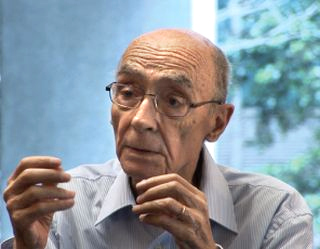“If I'm sincere today, what does it matter if I regret it tomorrow?”
Zdroj: Blindness (1995), p. 290
José Saramago bol portugalský spisovateľ, nositeľ Nobelovej ceny za literatúru za rok 1998.
Saramago mal ukončené stredoškolské vzdelanie, bol dobrým žiakom, ale z finančných dôvodov nepokračoval v štúdiu a začal pracovať ako strojný zámočník. Neskôr pracoval ako maliar, vydavateľ, novinár a prekladateľ. Vo vydavateľstve pracoval dvanásť rokov vo funkcii produkčného a literárneho riaditeľa. Pracoval aj pre časopis „Seara Nova“ ako literárny kritik.
Koncom sedemdesiatych rokov začal byť známym svojou románovou tvorbou, ale slávnym sa stal až románom Povesť o kláštore , ktorého dej sa zakladal na realite, zmiešanej s magickými motívmi.
Wikipedia

“If I'm sincere today, what does it matter if I regret it tomorrow?”
Zdroj: Blindness (1995), p. 290
Orientamo-nos por normas geradas segundo consensos, e domínios, mete-se pelos olhos dentro que variando o domínio varia o consenso, Não deixas saída, Porque não há saída, vivemos num quarto fechados e pintamos o mundo e o universo nas paredes dele.
Zdroj: The History of the Siege of Lisbon (1989), p. 267
Interview with Edney Silvestre, 2007.
Mal sabendo ainda soletrar, já lia, sem perceber que estava lendo. Identificar na escrita do jornal uma palavra que eu conhecesse era como encontrar um marco na estrada a dizer-me que ia bem, que seguia na boa direcção. E foi assim, desta maneira algo invulgar, Diário após Diário, mês após mês, fazendo de conta que não ouvia as piadas dos adultos da casa, que se divertiam por estar eu a olhar para o jornal como se fosse um muro, que a minha hora de os deixar sem fala chegou, quando, um dia, de um fôlego, li em voz alta, sem titubear, nervoso mas triunfante, umas quantas linhas seguidas.
Zdroj: Small Memories (2006), pp. 87–88
“Destiny isn’t taken in by people trying to make what came first come afterwards.”
Zdroj: The Cave (2000), p. 12 (Vintage 2003)
“You know the name you were given,
You do not know the name you have”
"The book of certainties"
All the Names (1997)
"Efe" report, Folha de São Paulo http://www1.folha.uol.com.br/folha/ilustrada/ult90u68178.shtml, 2007.
Se não formos capazes de viver inteiramente como pessoas, ao menos façamos tudo para não viver inteiramente como animais.
Zdroj: Blindness (1995), p. 116
“I write to try to understand, and because I have nothing better to do.”
"Efe" report, in Arrecife de Lanzarote (Spain), "Saramago diz que escreve por não ter 'nada melhor para fazer'", published in Folha de São Paulo http://www1.folha.uol.com.br/folha/ilustrada/ult90u68178.shtml, 2007.
...eu já estava na vigésima parte do livro, triste, quando senti que o livro podia ser escrito. Percebi que só seria capaz de escrevê-lo se o fizesse como se contasse. Não passando para a escrita o chamado discurso oral, porque isso é impossível, mas introduzindo na escrita um me-canismo de aparente prolixidade, aparente desor-ganização do discurso. Digo aparente porque sei o trabalho que me deu fazer de conta que era tudo assim.
Interview in Idéias, no. 107 (15 October 1988), trans. Margaret Jull Costa.
“Blind people do not need a name, I am my voice, nothing else matters.”
Zdroj: Blindness (1995), p. 290
“The possibility of the impossible, dreams and illusions, are the subject of my novels.”
Introduction
The Stone Raft (1994)
“No one has committed so much sin in his life that he deserves to die twice.”
Originál: (pt) Ninguém na vida teve tantos pecados que mereça morrer duas vezes.
Zdroj: The Gospel According to Jesus Christ (1991), p. 362